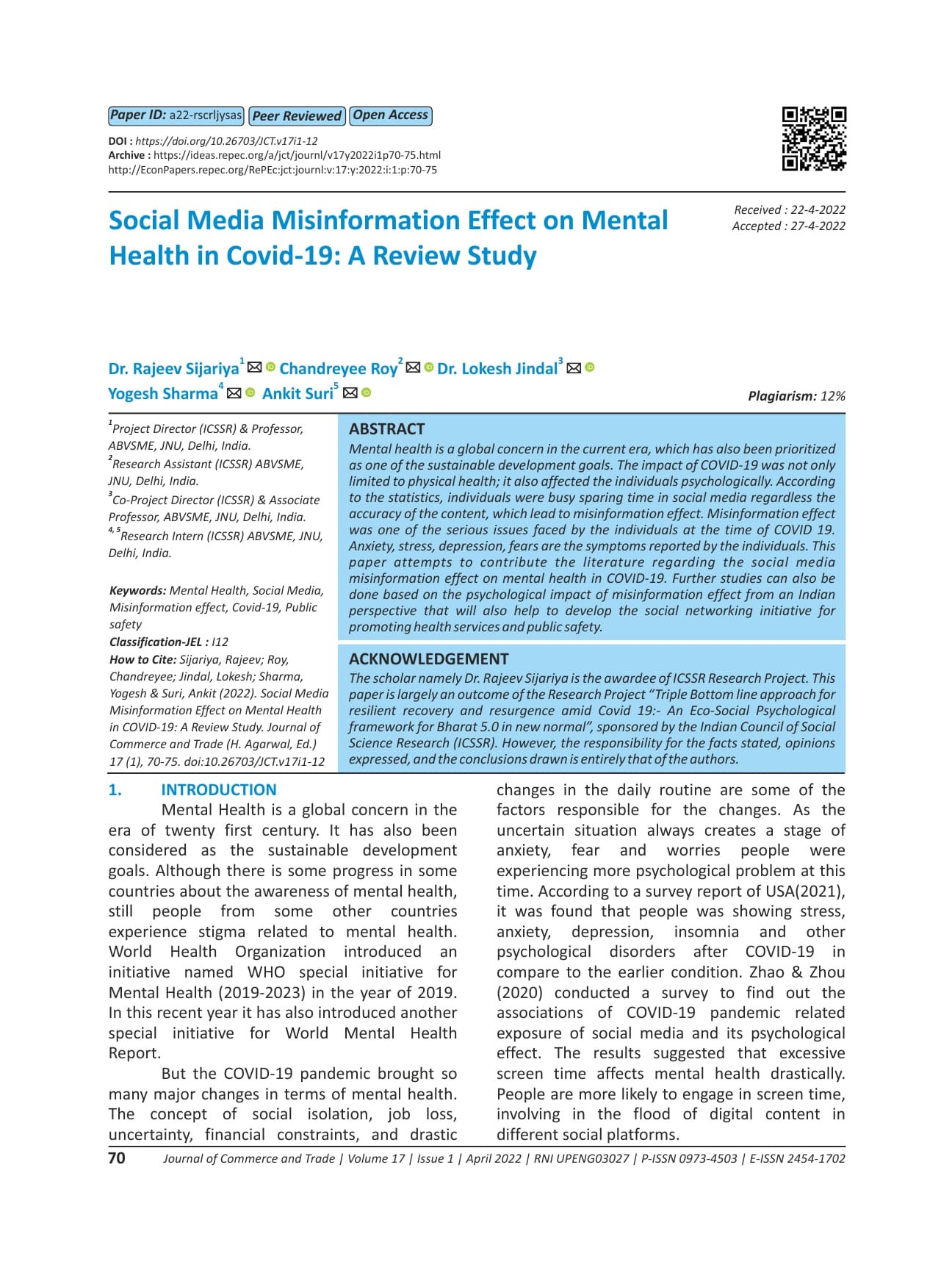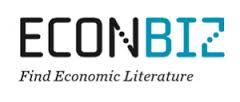Social Media Misinformation Effect on Mental Health in Covid-19: A Review Study
DOI:
https://doi.org/10.26703/JCT.v17i1-12Keywords:
Mental Health, Social Media, Misinformation Effect, Covid-19, Public SafetyAbstract
Mental health is a global concern in the current era, which has also been prioritized as one of the sustainable development goals. The impact of COVID-19 was not only limited to physical health; it also affected the individuals psychologically. According to the statistics, individuals were busy sparing time in social media regardless the accuracy of the content, which lead to misinformation effect. Misinformation effect was one of the serious issues faced by the individuals at the time of COVID 19. Anxiety, stress, depression, fears are the symptoms reported by the individuals. This paper attempts to contribute the literature regarding the social media misinformation effect on mental health in COVID-19. Further studies can also be done based on the psychological impact of misinformation effect from an Indian perspective that will also help to develop the social networking initiative for promoting health services and public safety.
Classification-JEL: I12
Acknowledgement
The scholar namely Dr. Rajeev Sijariya is the awardee of ICSSR Research Project. This paper is largely an outcome of the Research Project “Triple Bottom line approach for resilient recovery and resurgence amid Covid 19:- An Eco-Social Psychological framework for Bharat 5.0 in new normal”, sponsored by the Indian Council of Social Science Research (ICSSR). However, the responsibility for the facts stated, opinions expressed, and the conclusions drawn is entirely that of the authors.
Downloads
References
Abbas, J., Wang, D., Su, Z., & Ziapour, A. (2021). The role of social media in the advent of COVID-19 pandemic: crisis management, mental health challenges and implications. Risk management and healthcare policy, 14, 1917.
Gunasekeran, D. V., Chew, A., Chandrasekar, E. K., Rajendram, P., Kandarpa, V., Rajendram, M., ... & Leong, C. K. (2022). The Impact and Applications of Social Media Platforms for Public Health Responses Before and During the COVID-19 Pandemic: Systematic Literature Review. Journal of Medical Internet Research, 24(4), e33680.
Jabbour, D., Masri, J. E., Nawfal, R., Malaeb, D., & Salameh, P. (2022). Social media medical misinformation: impact on mental health and vaccination decision among university students. Irish Journal of Medical Science (1971), 1-11.
Kushner, J. (2020). The role of social media during a pandemic. Retrieved from khoros. com/blog/social-medias-role-during-covid-19.
Lee, J. J., Kang, K. A., Wang, M. P., Zhao, S. Z., Wong, J. Y. H., O'Connor, S., ... & Shin, S. (2020). Associations between COVID-19 misinformation exposure and belief with COVID19 knowledge and preventive behaviors: cross-sectional online study. Journal of medical Internet research, 22(11), e22205.
Mitchell, A., & Oliphant, J. (2020). Americans immersed in COVID-19 news; most think media are doing fairly well covering It. Pew Research Center [Blog post].
Luo, H., Cai, M., & Cui, Y. (2021). Spread of misinformation in social networks: Analysis based on Weibo tweets. Security and Communication Networks, 2021.
Rocha, Y. M., de Moura, G. A., Desidério, G. A., de Oliveira, C. H., Lourenço, F. D., & de Figueiredo Nicolete, L. D. (2021). The impact of fake news on social media and its influence on health during the COVID-19 pandemic: A systematic review. Journal of Public Health, 1-10.
Skafle, I., Nordahl-Hansen, A., Quintana, D. S., Wynn, R., & Gabarron, E. (2022). Misinformation about Covid-19 Vaccines on Social Media: Rapid Review. Journal of medical Internet research, 24(8), e37367.
Tankovska, H. (2021). Social media use during COVID-19 worldwide–Statistics & facts. Statistica. https://www. statista. com/topics/7863/social-media-use-during-coronaviruscovid-19-worldwide.
Volkmer, I. (2021). Social media and COVID-19: A global study of digital crisis interaction among Gen Z and millennials.World health organisation.
Yeung, A. W. K., Tosevska, A., Klager, E., Eibensteiner, F., Tsagkaris, C., Parvanov, E. D., & Atanasov, A. G. (2022). Medical and Health-Related Misinformation on Social Media: Bibliometric Study of the Scientific Literature. Journal of Medical Internet Research, 24(1), e28152.
Zhao, N., & Zhou, G. (2020). Social media use and mental health during the COVID‐19 pandemic: Moderator role of disaster stressor and mediator role of negative affect. Applied Psychology: Health and Well‐Being, 12(4), 1019-1038.

Downloads
Published
Issue
Section
License
Copyright (c) 2022 Dr. Rajeev Sijariya, Chandreyee Roy, Dr. Lokesh Jindal, Yogesh Sharma, Ankit Suri

This work is licensed under a Creative Commons Attribution 4.0 International License.










